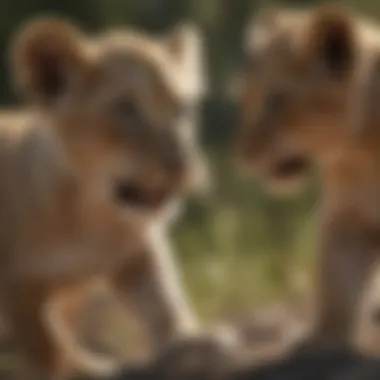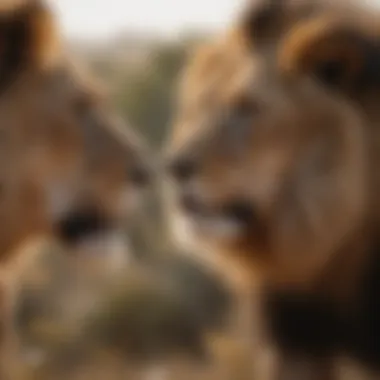Unveiling the Intricacies of Lion Pride: A Detailed Exploration


Nature Overview Topic
Lions are fascinating creatures that inspire awe and admiration for their majestic presence and complex social structures. In the vast savannas of Africa, lion prides reign supreme, showcasing a remarkable blend of cooperation, hierarchy, and survival skills. As we embark on this in-depth exploration of lion prides, we will uncover the secrets behind their leadership dynamics, hunting strategies, and critical roles within the circle of life.
Fun Facts and Trivia
Did you know that lions are the only cats that live in groups, known as prides? These prides can consist of up to 40 lions, including lionesses, cubs, and a dominant male lion. Additionally, lions spend a significant amount of time resting, often lounging for up to 20 hours a day. These and other intriguing facts about lion behaviors and lifestyle will captivate young readers and foster a deeper appreciation for these stunning animals.
Wildlife Insights
Exploring the world of lion prides unveils a web of interconnected species within their ecosystem. From the charismatic zebras grazing nearby to the vigilant gazelles on the lookout for danger, each animal plays a crucial role in maintaining the delicate balance of nature. Dive into the habitats shared by lions and their fellow wildlife inhabitants, learning about the unique adaptations and behaviors that enable these creatures to thrive in their environment.
Environmental Conservation
The conservation of lion prides and their habitats is paramount to ensuring the long-term survival of these regal cats. By understanding the importance of wildlife conservation and sustainable practices, children can actively contribute to safeguarding the future of lions and other endangered species. Discover practical tips on how families can support conservation efforts and create a positive impact on the environment, empowering the next generation to become stewards of the natural world.
DIY Nature Activities
Bring the wonders of lion prides into your home with engaging DIY nature activities that spark creativity and curiosity. From crafting lion masks to simulating hunting strategies through educational games, children can immerse themselves in hands-on experiences that deepen their understanding of these magnificent animals. Explore step-by-step guides for nature-inspired projects and outdoor explorations that encourage kids to connect with nature and appreciate the beauty of the animal kingdom.
Introduction to Lion Prides
The opening section of this detailed exploration delves into the intricate dynamics of lion prides, unraveling the significance and complexity of these social units in the wild. Lions, known as the 'kings of the jungle,' form prides that are vital for their survival and reproductive success. Understanding the behavior and structure of these prides is crucial for gaining insights into the natural world and the delicate balance of ecosystems.
Definition and Overview
Definition of a Lion Pride
The composition of a lion pride reflects a distinct social structure among these majestic creatures. A pride typically consists of related lionesses, their offspring, and a dominant male known as the pride leader. This cooperative unit enables lions to cooperate in hunting, defend their territory, and ensure the survival of the group. The cohesion within a pride is a key factor that distinguishes lions from solitary hunters, showcasing their adaptability and collaborative nature in the wild.


Significance in the Ecosystem
The importance of lion prides transcends their individual interactions, extending to broader ecosystem dynamics. As apex predators, lions play a pivotal role in regulating prey populations, maintaining ecological balance, and preserving biodiversity. By controlling herbivore numbers, lions prevent overgrazing and promote the health of plant species. Furthermore, their presence has cascading effects on various species within their habitat, showcasing the interconnectedness of wildlife communities.
Composition of a Lion Pride
Roles within the Pride
Within a lion pride, each member plays a specialized role that contributes to the overall functioning of the group. Lionesses are the primary hunters, utilizing teamwork and strategic coordination to secure prey for the pride. The dominant male safeguards the territory, mating rights, and the overall safety of the group. Younger lions assist in learning essential hunting skills through play and observation, preparing them for future roles within the pride.
Social Structure and Hierarchy
The social hierarchy within a lion pride is intricately delineated, with a clear ranking system dictating interactions and resource access. The dominant male, often referred to as the alpha lion, holds authority over the pride and makes crucial decisions regarding territory, conflicts, and reproduction. Lionesses uphold a cooperative structure, working collectively to rear cubs, defend the territory, and coordinate hunts. This hierarchical organization ensures efficient allocation of resources and maximizes the pride's chances of survival.
Territorial Behavior
Marking Territory
One of the fundamental behaviors of a lion pride is territor (text exceeds limit)
Leadership in Lion Prides
In the intricate network of a lion pride, leadership plays a pivotal role in ensuring the survival and success of the group. The alpha male, a figure of authority and strength, is tasked with various responsibilities and duties that govern the dynamics within the pride. From maintaining order to guiding hunting expeditions, the alpha male's presence is essential for cohesion and stability. Through its leadership, the alpha male not only secures mating rights but also safeguards the territory from external threats, showcasing a strategic approach to maintaining the pride's hierarchy and integrity.
Role of the Alpha Male
Responsibilities and Duties
The responsibilities and duties shouldered by the alpha male are diverse and demanding. From defending the pride against intruders to mediating conflicts among members, the alpha male must display courage and decisiveness in safeguarding the pride's interests. Its duty extends to overseeing the well-being of the pride, ensuring that all members are cared for and respected. By shouldering these responsibilities, the alpha male solidifies its dominance and asserts control over critical aspects of the pride's functioning.
Reproduction and Mating Rights


Reproduction and mating rights lie at the core of the alpha male's role within the pride. With exclusive rights to mate with the females, the alpha male ensures the perpetuation of its genetic lineage, maintaining a strong bloodline within the pride. This dominance in mating opportunities not only secures the alpha male's genetic legacy but also determines the future composition and dynamics of the pride. While advantageous in terms of preserving dominance, this exclusivity may also lead to conflicts and challenges from rival males vying for reproductive success.
Female Leadership
In contrast to the alpha male's overt dominance, female leadership within a lion pride operates through collaborative decision-making and strategic coordination. The lionesses, proficient hunters in their own right, spearhead the planning and execution of hunts, displaying exceptional teamwork and communication skills. The coordination of hunts not only ensures the pride's sustenance but also fosters a sense of unity and purpose among the female members. Moreover, in the crucial task of cub rearing and protection, lionesses exhibit unmatched dedication and vigilance, safeguarding the youngest members of the pride from potential threats and dangers.
Coordination of Hunts
The coordination of hunts exemplifies the strategic prowess of female leadership within lion prides. By synchronizing movements and communication, lionesses orchestrate complex hunting strategies that maximize efficiency and success. Through roles defined by specialization and cooperation, the lionesses showcase adaptability and intelligence in securing food resources for the entire pride. This aspect of female leadership highlights the critical contribution of lionesses in shaping the pride's survival and well-being.
Cub Rearing and Protection
Cub rearing and protection are paramount tasks that underscore the nurturing instincts and resilience of lioness leadership. From teaching young cubs essential skills to shielding them from potential predators, lionesses uphold a tradition of care and support that ensures the pride's continuity. The unique feature of communal care among lionesses fosters bonds of kinship and solidarity, emphasizing shared responsibility in raising future generations. Despite potential challenges and risks, the dedication of lionesses to cub rearing embodies a harmonious blend of nurture and defense within the pride.
Communication and Interaction
Communication and Interaction: The topic of Communication and Interaction plays a vital role in unraveling the complex dynamics of lion prides in the wild. Understanding how these majestic creatures convey messages and establish social bonds is essential in comprehending their behavior. Communication within a lion pride involves a combination of vocalizations and body language, which serve as the primary means of expressing emotions, intentions, and dominance hierarchies. By delving into the intricacies of how lions communicate and interact within their pride, we gain valuable insights into their social structure and behavioral patterns. Observing their interactions provides a window into the inner workings of these fascinating animals, shedding light on their unique way of forming relationships and maintaining order within the group.
Vocalizations and Body Language
Roaring and Growling: When it comes to the specifics of Roaring and Growling, these vocalizations are fundamental in the repertoire of communication among lion prides. Roaring, with its deep and reverberating sound, serves as a warning call, a territorial declaration, and a means of locating pride members. Growling, on the other hand, indicates aggression, dissatisfaction, or communication during feeding activities. The key characteristic of Roaring and Growling lies in their ability to convey information over long distances, ensuring that all pride members are aware of imminent dangers, territory boundaries, or emotional states. Despite occasional ingle, Roaring and Growling remain essential tools in the lion's communicative toolbox given their distinctive sound frequencies and robust nature.
Tail Movements and Postures: Another crucial aspect of Communication and Interaction is the use of Tail Movements and Postures within lion prides. Lions often communicate through subtle flicks or positions of their tails, indicating moods, intentions, or readiness to engage. Tail movements such as flagging, twitching, or lashing convey messages of submission, excitement, or aggression, respectively. The unique feature of Tail Movements and Postures lies in their non-verbal nature, allowing lions to communicate silently yet effectively within the pride. Although subject to ocasional misadditions, the advantage of this form of communication is its ability to convey messages without attracting unwanted attention or alerting potential prey, serving as a silent language among the members.
Bonding and Socialization
Play Behavior: Within the realm of Bonding and Socialization, Play Behavior emerges as a critical component of lion pride interactions. Play behavior among lion cubs fosters essential skills for future hunting and social cooperation within the pride. Through playful interactions such as mock fights, chasing games, and wrestling matches, lion cubs learn valuable lessons in coordination, agility, and communication. Play Behavior not only strengthens bonds among pride members but also promotes cognitive development and physical dexterity among the younger generation. Despite occasionalictured misspled words, Play Behavior remains a cornerstone of lion pride dynamics, facilitating learning, bonding, and skill development among the playful members.
Grooming Rituals: Another significant aspect of Bonding and Socialization within lion prides is the practice of Grooming Rituals. Grooming, characterized by the meticulous cleaning and grooming of fellow pride members' fur, serves as a bonding ritual that reinforces social connections and hierarchy within the group. Through grooming sessions, lions exhibit care, trust, and intimacy, strengthening the communal ties that bind the pride together. The unique feature of Grooming Rituals is the reciprocity involved, where individuals take turns grooming each other, fostering a sense of unity and cooperation. Despite ocasional Quikck glance at my phone, Grooming Rituals play a crucial role in maintaining harmony, reducing tension, and fostering relationships among the members within the pride.
Hunting Strategies and Techniques


In the wild, the topic of hunting strategies and techniques for lion prides is of utmost importance due to its direct impact on the survival and success of the pride. Lions are apex predators that rely on their hunting skills to procure food for the entire group. Understanding the specific elements of hunting strategies and techniques allows us to appreciate the sophisticated nature of lion behavior in the wild. By delving into this aspect, we can uncover how these tactics ensure the pride's sustenance and cohesion.
Coordinated Hunts
- Ambush Tactics: When examining ambush tactics within the context of lion prides, we encounter a vital strategy employed during hunts. Ambush tactics involve lions concealing themselves, waiting for the opportune moment to pounce on unsuspecting prey. This approach is characterized by patience and precision, contributing significantly to the pride's ability to secure meals efficiently. The unique feature of ambush tactics lies in their silent yet calculated nature, offering an advantage in surprising and overpowering prey swiftly.
- Group Coordination: Group coordination plays a pivotal role in the hunting strategies of lion prides. By working together seamlessly, lions enhance their chances of capturing prey successfully. This aspect involves intricate communication and teamwork, where each member contributes to the collective goal of a successful hunt. The key characteristic of group coordination is the synchronization of actions, ensuring a unified effort towards achieving the shared objective. Despite its advantages in boosting hunting success rates, group coordination also poses challenges related to maintaining hierarchy and managing individual roles within the pride.
Prey Selection
In the realm of prey selection for lion prides, critical decisions are made based on factors that influence hunting efficiency and resource optimization. Hunting preferences dictate the types of prey targeted by lions and are guided by various criteria that align with the pride's needs. Exploring hunting preferences sheds light on the adaptive behaviors that lions exhibit to secure sustenance effectively.
Hunting Preferences
- Hunting Preferences: When exploring hunting preferences, we delve into the specific types of prey favored by lion prides. These preferences are shaped by factors such as prey accessibility, nutritional value, and the ease of capture. Understanding hunting preferences provides insights into the ecological dynamics influencing lion behavior and food consumption patterns. By honing in on these preferences, we unravel the strategic choices made by lions to thrive in their natural habitat.
- Targeting Weak Individuals: The selection of weak individuals as targets during hunts is a strategic maneuver employed by lion prides. Targeting weak individuals plays a dual role in enhancing hunting success and maintaining the ecosystem's balance. By focusing on vulnerable prey, lions minimize the risk associated with capturing stronger opponents while also regulating prey populations effectively. The key characteristic of targeting weak individuals lies in its strategic advantage of conserving energy and ensuring successful hunts, contributing to the survival and adaptation of lion prides in the wild.
Reproductive Behavior and Cub Rearing
In this section, we will delve into the critical aspects of reproductive behavior and cub rearing within lion prides, illuminating the key elements that shape the dynamics of these majestic creatures. The process of mating and nurturing offspring plays a pivotal role in maintaining the pride's vitality and growth. Understanding the intricacies of reproductive behavior and cub rearing provides insights into the survival strategies and social bonds within the pride. From mating rituals to caring for the young, every step in this reproductive journey showcases the resilience and complexity of lion prides.
Mating Season
Peak Times for Mating
Exploring the peak times for mating in lion prides unveils a crucial element of their reproductive cycle. During these specific periods, the pride experiences heightened activity and heightened interactions among its members. Peak times for mating signify a surge in hormonal activity, triggering courting behaviors and mating rituals crucial for the pride's continuity. Understanding the timing of peak mating seasons offers valuable insights into the reproduction dynamics and social structure of lion prides. Despite the challenges that come with increased competition and territorial disputes during peak mating seasons, they remain a fundamental aspect of sustaining lion populations in the wild.
Male Competition
Delving into male competition sheds light on the intense dynamics underlying reproductive behavior within lion prides. Competition among males for mating rights and dominance within the pride significantly influences their behavior and interactions. The competition drives males to showcase their strength, prowess, and strategic abilities to secure mating opportunities. Despite the fierce nature of male competition, it contributes to genetic diversity and the strengthening of the pride's overall resilience. Understanding the intricacies of male competition provides a deeper appreciation for the challenges and strategic maneuvers that shape the leadership structure within lion prides.
Nurturing Offspring
Shared Caregiving
The concept of shared caregiving among lion pride members highlights a collaborative approach to raising and protecting their offspring. Shared caregiving involves the collective effort of pride members in nurturing and safeguarding the young ones, showcasing a strong sense of unity and social cohesion within the pride. Through shared caregiving, adult lions demonstrate altruism and cooperative behavior towards the well-being of the entire pride. This nurturing strategy strengthens familial bonds and fosters a sense of community among pride members, ensuring the survival and development of future generations.
Educational Play
Educational play serves as a vital aspect of cub development within lion prides, offering young ones the opportunity to hone essential skills through interactive learning experiences. Cubs engage in playful activities that mimic hunting behaviors, social interactions, and physical exercises, preparing them for the challenges they will face as they mature. Educational play not only fosters physical strength and agility in cubs but also promotes cognitive development and problem-solving abilities. By engaging in educational play, lion cubs acquire essential survival skills and strengthen their bond with pride members, shaping them into capable and resilient predators in the wild.







